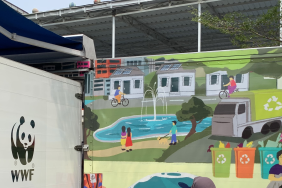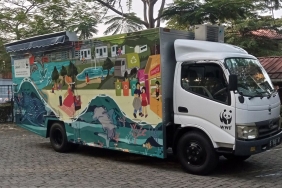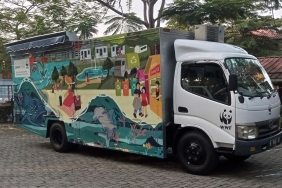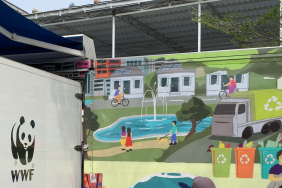EXPLORING INDONESIA'S FORESTS ON NATIONAL CHILDREN'S DAY
"Now, kids, it's time for us to explore the forests of Indonesia. There will be Kak Elsa who will accompany you. Let's check each of the equipment that will be used to explore," said Resti Octaviani from the WWF-Indonesia Panda Mobile team to the Panda Mobile Virtual Class participants on Friday (07/24).
The participants, aged around 4 to 13 years old, were busy preparing their equipment. Some brought binoculars, pocket cameras, backpacks, and so on. The attributes they wore were complete with jungle hats on their heads. Thirty-four children who joined the Panda Mobile Virtual Class themed Exploring Indonesian Forests with WWF were participants of the National Children's Day (HAN) commemoration initiated by Rumah Dongeng Pelangi (RDP).
"Exploring Indonesian Forests with WWF is one of a series of activities in the framework of National Children's Day that Rumah Dongeng Pelangi organizes. So we made it in exploring Indonesia from Sabang to Merauke. Well, when we found out that Panda Mobile has the concept of a virtual event to explore and observe and others, we were interested in making it part of our series of activities. Then we did Jelajah Hutan Indonesia with WWF," said Emmanuella Mila, initiator of Rumah Dongeng Pelangi.
The participants who attended the Panda Mobile Virtual Class this time came from various cities. Some were from Jogja, some from Bandung, some from Kalimantan, Medan, Semarang, Surabaya, and other cities. This virtual class can indeed be attended by children throughout Indonesia. Now, distance is no longer a barrier for Panda Mobile to reach children in every region.
During the Covid-19 pandemic, distance learning has become the main option to limit the massive spread of the virus. Through Panda Mobile Virtual Class, the WWF-Indonesia team invited friends from Rumah Dongeng Pelangi (RDP) to learn more about biodiversity and six umbrella species before exploring the forest in one of WWF-Indonesia's work locations in a virtual tour. The activity that took place in the series of National Children's Day began with an introduction from WWF-Indonesia and ended with games from RDP.
During the class, Annisa Aysahra volunteer Panda Mobile gave a little description of what the six umbrella animals look like, the threats they face, and the activities we can do to protect their habitat and current population. The activity was interspersed with ice-breaking so that the participants could stay focused and enthusiastic in receiving material from Panda Mobile's siblings.
After receiving the material, participants were ready to take a trip through a virtual tour guided by Sabrina Elsa, a Panda Mobile volunteer. In accordance with the theme of the event "Exploring Indonesian Forests with WWF" the participants prepared with the attributes worn at their respective homes. They were invited to the water field station at Rimbang Baling. Rimbang Baling is named after the combination of two hills, Bukit Rimbang and Bukit Baling. Located in Riau Province and directly adjacent to North Sumatra. There lives a group of Sumatran Tigers, in addition to tigers also live other big cat relatives such as clouded leopards, gold cats, jungle cats, leopards, rock cats, tapirs, and sun bears. Participants were also able to see tigers through camera traps. This succeeded in making the kids experience another way of enjoying the beauty of nature and provoked their curiosity which was shown through their comments in the Zoom app's chat column.
"Sis, are tigers evil?" asked one of the participants.
"Tigers are not evil, but they will fight to protect themselves when they feel threatened. This is also useful to maintain the food chain so that it can be maintained, "replied Resti.
The participants were also given an explanation of activities at home that can be done in protecting endangered animals. One of them, by saving the use of paper and tissue because this has a huge impact on the original habitat of the animals and the number of trees in the forest. The main benefit of protecting animals and plants in Indonesia is for the balance of the ecosystem so that life on Earth continues to run well for current and future generations. Not only animals and plants benefit, but also humans because they are part of biodiversity. The approximately 90-minute Panda Mobile Virtual Class ran smoothly. The enthusiasm of the participants was seen while listening to explanations about biodiversity and exploring the forest with the Panda Mobile team.
"Hopefully more often Panda Mobile or WWF-Indonesia will make activities like this. I think because of conditions like this (pandemic), there are more virtual activities because there are certainly many other forests that we can explore more deeply, get to know animals in more detail. Surely the children will like it. Keep up the good work WWF brothers and sisters. Make it again! We'll come again," concluded Kak Mila when interviewed via WhatsApp.





